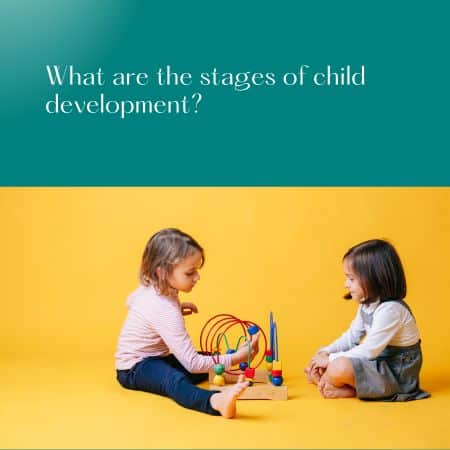The Stages of Child Development
Child development is physical, cognitive, emotional and social growth integrating different aspects and is a very complicated and encompassing process. The well-being of the child wholly depends on the essential understanding of the growth and development aspects of the child as explained within the stages of development for parents, guardians, teachers and other caregivers. Theories surrounding child development, even though they differ widely, seem to follow a basic set of constructs that involve sequential stages with some known characteristics. This article brings to light the important development phases with an in-depth analysis of the significant features and the determinants of the growth process of the child.
Prenatal Stage (Conception to Birth)
The prenatal period is perhaps the most important time in a person’s life and it is the time in which the brain and different physical aspects of a child are able to begin developing. This period is separated into three sub-periods:
- Germinal Stage (0-2 weeks): The zygote which is a fertilised ovum begins the process of division of cells interfering with the walls of the uterus.
- Embryonic Stage (3-8 weeks): In this stage, important structures such as a heart, a brain, a nervous system, and cartilage begin to form as well.
- Fetal Stage (9 weeks to birth): Rapid growth of the fetus takes place where different functions become more complex than before.
Maternal conditions such as health, nutrition, and taking harmful substances are dominant factors that influence the development process during this period.
Appropriate evidence indicates that prenatal care is influential in decreasing risks for congenital impairments or growth deficiencies.
Infancy and Toddlerhood (Birth to 3 Years)
This period is characterised by growth in all domains including physical, cognitive, and emotional. As infants develop, they have remarkable growth that sees them attain developmental tasks such as sitting, crawling, walking, and attachments.
Key Features,
Physical Development:
infant’s reflexes such as sucking or grasping are inborn reflexes that may also be replaced by learned voluntary actions. Both gross and fine motor skills develop for tasks like walking and gripping respectively.
Cognitive Development:
Following the idea of Piaget, this period corresponds with the sensorimotor stage, second stage of cognitive development, where children are known to learn through their senses and movement of various body parts. Age 8 marks the general understanding of object permanence: the perception of an object continuing to exist, even though the object is not within sight.
Emotional and Social Development:
Attachments to caregivers are the basis from which later connections will be built. Infants even start showing distinct emotions such as joy, anger and fear.
Critical Milestones,
- 6 weeks: Smiling There is recognition of family members and an inclination to smile at them.
- 12 months: First words come in this one.
- 12-18 months: Children start walking alone (compared to with support).
3. Early Childhood (3 to 6 Years)
The period classified between the ages 3-6 is also referred to as preschool years. During this period children’s language, their imagination and their social interactions expand tremendously.
Key Features,
- Physical Development: Enhancement of coordination and balance aids children in running, jumping, and climbing.
Fine motor skills develop the necessary muscle control required for activities like drawing, writing and using eating utensils.
- Cognitive Development: According to Piaget, this stage is referred to as the preoperational stage, where children take part in symbolic play and start to imagine things along with remembering past events; however, a lot of their doing is centred on themselves.
- Emotional and Social Development: The child starts to make friends and learns how to share and collaborate. Emotional regulation improves, but the child does experience some angry outbursts.
Important Milestones
- Learning basic self-care practices such as dressing and feeding.
- Over 2,500 words by the age of 6 (vocabulary spurt)
- Development of pretend play, storytelling and similar activities
This is the time when most of the physical growth is stable and there is development of more cognitive and social skills.
Significant Aspects
- Physical Development: Growth tends to be smoother through the ages, but the rate of growth tends to decrease. Strength, balance and coordination develop in most children’s anatomy and physiology, engaging in multiple sports and physical activities.
- Cognitive Development: In cognitive development, the topic at hand is Piaget’s theories in detail. Based on his work, this stage correlates to the concrete operational stage, where children start to develop logic. They can accomplish tasks such as classifying, ordering, and conceiving the idea of volume (i.e. the child understands that the volume does not change even if the shape does).
- Emotional and Social Development: Friendships with peers gain more focus.
Teamwork, empathy, and conflict resolution are some of the skills that children master. Through the mastery of these skills, they enhance their self-confidence and sense of identity.
Historical Chain of Events:
- Being able to read and write efficiently and fluently.
- Engaging in group tasks and making closer friends or bonding.
- Sensitivity towards being able to think, reason and solve complex situations or problems.
Key Features:
- Physical Development: There is a release of hormones that bring about many changes such as the development of secondary sexual characteristics and sexual maturity.
- Cognitive Development: There is attainment of the formal operational stage as described by Piaget, characterised by advanced thought processes involving logic and abstract reasoning. Such adolescents begin to develop a greater sense of questioning and forgiveness in the context of ethics and morals.
- Emotional and Social Development: The formation of self and development of one’s identity take centre stage in light of Erikson’s psychosocial development theory. As an individual grasps the concept of adolescence, he begins to loosen his grip on family and instead intensifies his pursuit of peer friendships and relationships.
Historical Chain of Events:
- Developing an inner sense of self and a vision for the future.
- Spending time with close friends and having romantic feelings and/or interests.
- Developing good problem-solving and thinking skills.
Factors Affecting Development Over Time:
Certain factors act upon a child at every stage of development:
Biological Factors: Genetics and one’s physical state determine many of one’s biological and cognitive achievements.
How about one that begins with genetic factors or possibly being born too early.
Micro Socio-cultural aspect:
Family and economic factors are important. The growth and development process is enhanced by a conducive environment, but adverse conditions such as poverty and lack of attention can hinder development.
Schooling:
The availability of proper educational facilities, materials and learning aids is essential for cognitive and social development.
Attachment Parenting:
The practice of parenting that encompasses a tendency towards attachment promotes security and emotional management.
Societal Constructs:
Family, friends and the social environment influence emotional and social growth.
Why it is important to comprehend child development phases
There are specific reasons that parents, teachers and doctors ought to understand regarding the stages of a child’s development:
- Stages assist in customising efforts with regard to age considerations
- Assessment and management of delays that fall outside these stages
- Common developmental strategies that facilitate growth
- Efforts aimed at enhancing relationships through communication and understanding

